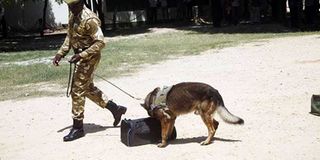Wildlife groups join hands to fight ivory trade

One of the newly-acquired KWS sniffer dogs goes through luggage at the official handing over of the dog by the African Wildlife Foundation on December 17, 2018. The dogs will be under seven well trained handlers who graduated in Tanzania at the AWF’s training school. PHOTO | LABAN WALLOGA | NATION MEDIA GROUP
What you need to know:
- The two organisations unveiled four specialised trained dogs to help deal with illegal trafficking.
- Mr Muruthi said poachers kill 35,000 elephants across Africa each year with three rhinos killed every day in the continent.
- The animals are killed for their tusks which the poachers transport illegally from one country to another.
The port of Mombasa remains the world’s largest port used for illegal ivory trade, a wildlife conservationist group has said.
The African Wildlife Foundation (AWF) said this even as it partnered with Kenya Wildlife Service (KWS) to strengthen the fight against the trafficking of trophies.
On Monday at KWS Marine Park in Mombasa, the two organisations unveiled four specialised trained dogs to help deal with illegal trafficking.
“We are being used as a conduit for the illegal trade through the port of Mombasa. Our port still remains the largest facility being used for trafficking of the trophies and that is why we are enhancing our efforts in collaboration with the government to deal with this menace,” said AWF head of species conservation Philip Muruthi.
TRAINED DOGS
The canines which are, Malinois and German Shepherd breeds, will be stationed at the port, airport, Standard Gauge Railway (SGR) and at the borders among other areas.
The dogs will be under seven well trained handlers who graduated in Tanzania at the AWF’s training school.
Mr Muruthi said poachers kill 35,000 elephants across Africa each year with three rhinos killed every day in the continent.
The animals are killed for their tusks which the poachers transport illegally from one country to another.
KWS acting director-general Charles Musyoki said the government is investing on the canines which have the ability to smell 400 times more than human beings.
“It is because of our efforts in investing in these animals that Kenya also managed to get out of the gang list of traders of trophies. There is no reason at all for one to pass with a gramme of ivory through the port,” he said.
KWS deputy director in charge of security Robert Mwasiya said the canines would also be deployed at the newly established one stop border.



